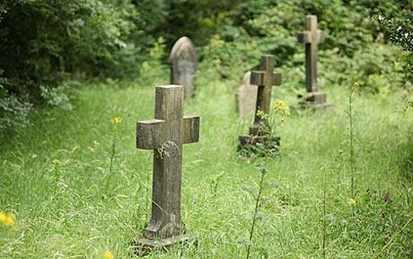比利时殡葬业人士最近提出一项尸体处理的新举措,建议将尸体放在腐蚀性溶液中溶解,然后将其冲入污水处理系统,再经净水厂处理后可回收利用。他们认为这样的处理方式跟火化或墓葬比起来既省钱又环保。这一建议一经提出便引起广泛争议,有反对人士指出这种做法对逝者太过冷漠,也会让人们觉得不安。目前,欧盟正在对此项建议进行研究,检验尸体溶解后的液体被排入污水系统是否安全,一旦获得批准,将会在欧洲范围内推广使用。美国的缅因、科罗拉多、佛罗里达、明尼苏达、俄勒冈以及马里兰等六个州已于近期通过立法准许尸体溶解方案运行。专家表示,虽然尸体溶解后的液体会被排入污水处理系统,但溶解后的残留物还是可以装入骨灰盒交给逝者家属保管的。

 |
|
The new method is said to be less expensive and more environmentally friendly than using up valuable land for graves. |
Belgian undertakers have drawn up plans to dissolve the corpses of the dead in caustic solutions and flush them into the sewage system.
The controversial new method is said to be less expensive and more environmentally friendly than running highly polluting crematoria or using up valuable land for graves.
The departed would go into the sewage systems of towns and cities and then be recycled in water processing plants.
The proposals are being studied by the EU and if approved, it would mean the procedure could be used across Europe.
However, opponents of the plans say it smacks of a Frankenstein callousness towards the dead and one survey in Belgium found many people found the idea "disturbing."
"The idea is for the deceased to be placed in a container with water and salts and then pressurised and after a little time, about two hours, mineral ash and liquid is left over," said a spokesman for the Flemish Association of Undertakers.
The European Commission is investigating whether the resulting liquid could safely be flushed into the sewage system. Authorities in the northern Belgian region have yet to decide whether to approve the process.
Six states in America – Maine, Colorado, Florida, Minnesota, Oregon, and Maryland have recently passed legislation that allow the process to be used.
Although experts insist that the ashes can be recycled in waste systems, the residue from the process can also be put in urns and handed over to relatives of the dead.
相关阅读
Brazil city proposes ban on death
(Agencies)

(中国日报网英语点津 Helen 编辑)
